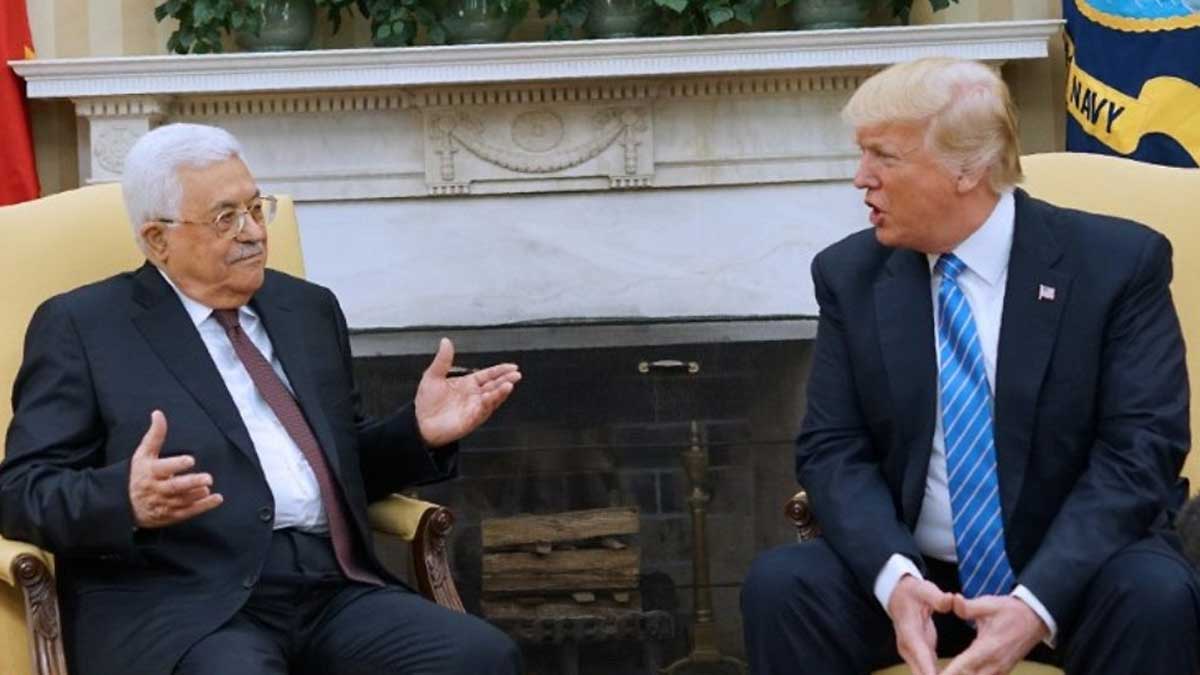- Home
- Billionaires
- Investing Newsletters
- 193CC 1000
- Article Layout 2
- Article Layout 3
- Article Layout 4
- Article Layout 5
- Article Layout 6
- Article Layout 7
- Article Layout 8
- Article Layout 9
- Article Layout 10
- Article Layout 11
- Article Layout 12
- Article Layout 13
- Article Layout 14
- Article Sidebar
- Post Format
- pages
- Archive Layouts
- Post Gallery
- Post Video Background
- Post Review
- Sponsored Post
- Leadership
- Business
- Money
- Small Business
- Innovation
- Shop
Recent Posts
Trump Posts Abbas’ Letter Before Netanyahu Meeting

On Tuesday night, former President Donald Trump shared a letter he received from Palestinian Authority President Mahmoud Abbas on his Truth Social platform, following an assassination attempt against him. Trump expressed his anticipation for advancing Middle East peace in the near future, just days before hosting Israeli Prime Minister Benjamin Netanyahu at his Mar-a-Lago residence.
In his Truth Social post, Trump included a screenshot of the letter from Abbas, which strongly condemned the recent assassination attempt against Trump. Abbas stated, “Acts of violence must not have a place in a world governed by law and order,” and described the attack as “despicable.” He extended his condolences to the victims’ families, acknowledging the tragic consequences of the shooting.
The Palestinian leader’s letter seems to signal an attempt to repair strained relations with Trump. The two had experienced a significant rift in 2017 when Trump’s administration officially recognized Jerusalem as Israel’s capital and relocated the U.S. embassy from Tel Aviv to Jerusalem. This move was met with strong condemnation from Abbas and the broader Palestinian leadership, who accused the U.S. of abandoning its role as a neutral peace mediator.
In response to Abbas’ letter, Trump appeared to have written a handwritten note of his own. The message, which he also shared online, read: “Mahmoud, so nice. Thank you. Everything will be good. Best wishes, Donald Trump.” This personal response reflects Trump’s ongoing engagement with the Palestinian leader despite past diplomatic tensions.
Trump’s post on Truth Social also highlighted his eagerness to meet with Netanyahu. He wrote, “I am looking forward to meeting Prime Minister Netanyahu on Friday and even more forward to achieving Peace in the Middle East!” This statement underscores Trump’s continued focus on Middle Eastern diplomacy and his desire to reaffirm his commitment to regional peace.
The backdrop of this upcoming meeting includes a complex history between Trump and the Palestinian leadership. During his presidency, Trump made several controversial decisions that affected U.S.-Palestinian relations. In early 2017, Trump’s administration hosted Abbas at the White House, where discussions focused on the possibility of a historic peace agreement between Palestinians and Israelis. However, the subsequent recognition of Jerusalem as Israel’s capital led to a severe backlash from the Palestinian Authority, which accused Washington of undermining its role as an impartial mediator.
Despite this, Trump has spoken positively about Abbas in later interviews. In a 2021 interview with Axios, Trump described Abbas as “terrific” and likened him to a father figure, suggesting that he was more committed to making a deal than Netanyahu. Trump’s comments contrasted sharply with his view of Netanyahu, whom he described less favorably, suggesting that Netanyahu was less interested in pursuing peace.
As Trump prepares for his meeting with Netanyahu, the Israeli Prime Minister has a busy schedule ahead. On Wednesday, Netanyahu will address a joint session of the U.S. Congress, marking a significant moment in his diplomatic visit. The following day, he is set to meet with President Joe Biden at the White House. These engagements are expected to focus on the current state of U.S.-Israel relations and regional issues.
Trump’s announcement of his upcoming meeting with Netanyahu via Truth Social was accompanied by a statement asserting that his previous tenure brought “Peace and Stability in the Region,” and expressing confidence that such conditions could be restored. Trump’s assertion reflects his belief that his administration’s policies were effective in promoting stability, a sentiment he has often emphasized since leaving office.
In terms of U.S. political dynamics, Vice President Kamala Harris will not attend Netanyahu’s congressional address but is scheduled to meet with him separately on Thursday. This arrangement highlights the high level of diplomatic activity surrounding Netanyahu’s visit and underscores the significance of U.S.-Israel relations in the current political climate.
As the meeting with Netanyahu approaches, all eyes will be on how the discussions unfold and what impact they might have on the broader Middle Eastern peace process. Trump’s continuing role as a key figure in this arena, along with Netanyahu’s visit and the engagement with Abbas, signifies a period of intense diplomatic activity that could shape future developments in the region.
In summary, Trump’s release of Abbas’ letter and his forthcoming meeting with Netanyahu are pivotal moments in the ongoing efforts to navigate Middle Eastern diplomacy. The interactions between these leaders will likely influence future peace initiatives and regional stability, reflecting the enduring complexity of the Israeli-Palestinian conflict and the broader geopolitical landscape.
Recent Posts
Categories
- 193cc Digital Assets2
- 5G1
- Aerospace & Defense44
- AI32
- Arts3
- Banking & Insurance11
- Big Data3
- Billionaires230
- Boats & Planes1
- Business309
- Careers13
- Cars & Bikes66
- CEO Network1
- CFO Network17
- CHRO Network1
- CIO Network1
- Cloud10
- CMO Network18
- Commercial Real Estate7
- Consultant1
- Consumer Tech157
- CxO1
- Cybersecurity54
- Dining1
- Diversity, Equity & Inclusion4
- Education7
- Energy8
- Enterprise Tech29
- Events11
- Fintech1
- Food & Drink2
- Franchises1
- Freelance1
- Future Of Work2
- Games135
- GIG1
- Healthcare75
- Hollywood & Entertainment158
- Houses1
- Innovation37
- Investing2
- Investing Newsletters4
- Leadership65
- Lifestyle10
- Manufacturing1
- Markets20
- Media184
- Mobile phone1
- Money13
- Personal Finance2
- Policy544
- Real Estate1
- Research6
- Retail1
- Retirement1
- Small Business1
- SportsMoney24
- Style & Beauty1
- Success Income1
- Taxes2
- Travel10
- Uncategorized6
- Vices1
- Watches & Jewelry2
- world's billionaires200
Related Articles
Musk and Ramaswamy Push $2 Trillion Federal Cuts via DOGE
Billionaires Elon Musk and Vivek Ramaswamy, co-leads of the Trump administration’s proposed...
By 193cc Agency CouncilNovember 23, 2024Alphabet Shares Fall 5% as DOJ Seeks Chrome Sale
Shares of Alphabet, the parent company of Google, dropped more than 5%...
By 193cc Agency CouncilNovember 22, 2024Carr’s FCC Nomination and Musk’s Potential Gains
President-elect Donald Trump has nominated Brendan Carr to lead the Federal Communications...
By 193cc Agency CouncilNovember 19, 2024Musk Joins Trump’s Call with Ukraine’s Zelensky
Billionaire Elon Musk played an unexpected role in a call between President-elect...
By 193cc Agency CouncilNovember 9, 2024















Leave a comment